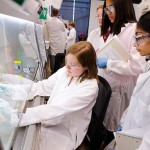Category Science & Technology
Documentary film portrays UW–Madison mindfulness research
MADISON – Groundbreaking research at the University of Wisconsin–Madison is the focus of the new documentary film, “Free the Mind,” which debuts in Madison tomorrow, May 15.
Early career award funds study of messenger RNA stability
In an effort to improve microorganisms that can sustainably produce fuels and chemicals, a University of Wisconsin–Madison engineer is using a U.S. Department of Energy award to study what - if anything - gets lost in the translation of genetic information.
Shakhashiri receives prestigious award for public education
Bassam Shakhashiri, a chemistry professor and William T. Evjue Distinguished Chair for the Wisconsin Idea at the University of Wisconsin–Madison, has received the 2013 Carl Sagan Award for Public Understanding of Science.
Unique engineering shop looks to another challenge of 21st century physics
Sequestered in the farmland near Stoughton, an unusual University of Wisconsin–Madison facility - part machine shop, part design lab, part physics outpost - continues to make machines, equipment and detectors for the world's most advanced experiments.
Adult cells transformed into early-stage nerve cells, bypassing the pluripotent stem cell stage
A University of Wisconsin–Madison research group has converted skin cells from people and monkeys into a cell that can form a wide variety of nervous-system cells - without passing through the do-it-all stage called the induced pluripotent stem cell, or iPSC.
With heart cells, middle schoolers learn the hard lessons of science
The drug trial is not off to an auspicious start. The cells are not cooperating.
UW flu expert elected to National Academy of Sciences
Yoshihiro Kawaoka, a professor of pathobiological sciences in the University of Wisconsin–Madison School of Veterinary Medicine and leading expert on influenza, has been elected to the U.S. National Academy of Sciences (NAS).
UW to offer new virtual internships to enhance women’s interest in engineering
The College of Engineering at the University of Wisconsin–Madison will offer for the first time a course entirely based on digital learning simulations in the fall of 2013.
Vaterite: Crystal within a crystal helps resolve an old puzzle
With the help of a solitary sea squirt, scientists have resolved the longstanding puzzle of the crystal structure of vaterite, an enigmatic geologic mineral and biomineral.
UW physicist works with young Rube Goldbergs at Madison elementary school
The rules are simple, explains Mike Randall, a University of Wisconsin–Madison physicist, who is leading the Rube Goldberg lab tonight at Emerson School in Madison. "Make a contraption that starts by dropping a marble and ends by ringing a bell."
New living, learning community to welcome biology students
To help bio newbies get off to the right start, as many as 130 students will begin 2014 in BioHouse, the university’s 10th residential learning community.
Filmmaker, glaciologist, artist to receive honorary degrees May 17
Honorary degrees will be bestowed on three individuals considered to be pioneers in their fields at UW–Madison commencement in May. One is a groundbreaking documentary filmmaker, another is a trailblazing glaciologist, and the third is a world-renowned glass artist.
Classes in the park unite middle schoolers with college students, nature
Trish O'Kane had reached a dead end. It was her first day teaching a capstone course in environmental studies at the Nelson Institute, and she was ready to forge ahead with a two-hour "college-style" lesson plan.
Madison startup company mounting two-pronged attack against influenza
As a new type of "bird flu" causes deaths and worries in China, a Madison startup is attacking the problem on two fronts. FluGen, under the scientific guidance of University of Wisconsin–Madison researcher Yoshihiro Kawaoka, a world authority on influenza, is moving ahead with a better way to deliver existing vaccines and a novel "universal" flu vaccine.
Stem cell transplant restores memory, learning in mice
For the first time, human embryonic stem cells have been transformed into nerve cells that helped mice regain the ability to learn and remember.
Cancer-screening software wins wireless competition
A software program for screening for cervical cancer, particularly in developing countries with limited resources, earned the top award and $10,000 in the Qualcomm Wireless Innovation Prize at the University of Wisconsin–Madison.
Gift of $5 million establishes two faculty chairs at School of Nursing
The University of Wisconsin–Madison School of Nursing has received a gift of $5 million from John and Tashia Morgridge in honor of Mary and Carl Gulbrandsen, establishing two permanently endowed faculty chairs - one in pediatric nursing and one in health systems innovation.
International astrophysics reaches Milwaukee
Trips to the South Pole usually require a lot of specialized equipment, but Nils Irland's packing list for his November 2012 visit included some items unusual even by those standards: a specially designed video camera, extra batteries, and lots and lots of data storage.
Kind honored for research support, advocacy
Interim Chancellor David Ward and the Science Coalition have presented Congressman Ron Kind (D-Wis.) with its Champion of Science Award in recognition of his strong commitment to funding the basic research that keeps the United States and the state of Wisconsin at the forefront of scientific discovery and technological innovation.
New bird flu strain seen adapting to mammals, humans
A genetic analysis of the avian flu virus responsible for at least nine human deaths in China portrays a virus evolving to adapt to human cells, raising concern about its potential to spark a new global flu pandemic.

